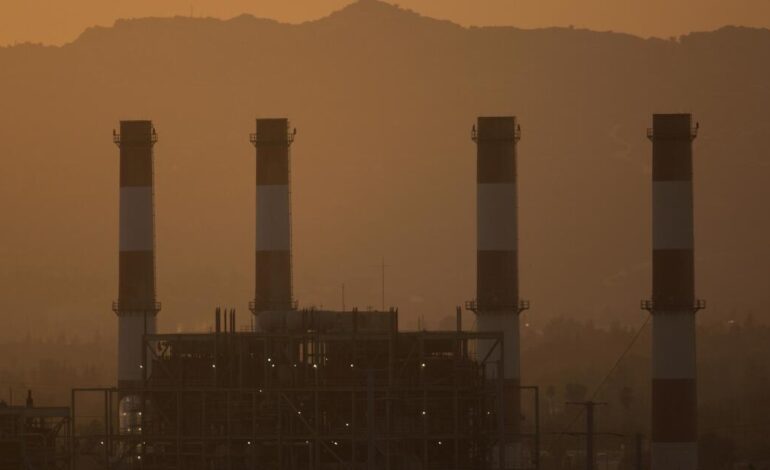Trump Administration Proposes End to Greenhouse Gas Reporting

The Trump administration has proposed a significant change to environmental regulations by moving to permanently end the Greenhouse Gas Reporting Program. Established nearly two decades ago, this program has required thousands of industrial plants across the United States, including those in California, to monitor and report their greenhouse gas emissions. This decision, announced this month, follows longstanding bipartisan support for the program, which originated during the presidency of George W. Bush.
Lee Zeldin, the administrator of the Environmental Protection Agency (EPA), justified the proposal by arguing that greenhouse gas reporting is costly and burdensome for businesses. He estimated that eliminating the program could save American businesses up to $2.4 billion in regulatory expenses. Yet, critics warn that this move will hinder state regulators’ ability to track climate progress. It will also reduce transparency for residents concerned about emissions from nearby power plants or factories.
“Measuring and reporting climate pollution is a critical step in reducing the deadly impacts of climate-driven extremes,” said Will Barrett, assistant vice president for nationwide clean air policy at the American Lung Association. He emphasized the importance of this data in addressing catastrophic weather events and health emergencies. The EPA’s program currently requires around 8,000 facilities, including power plants and oil refineries, to report their emissions, accounting for approximately 90% of the country’s total greenhouse gas emissions.
If finalized, the proposed changes would eliminate reporting obligations for most large facilities and all fuel and industrial gas suppliers, according to the EPA. This development follows lobbying efforts from various business groups seeking reduced regulatory burdens across federal agencies. Environmental organizations view this announcement as another setback from an administration that has already targeted numerous foundational climate programs. Earlier this year, the EPA proposed rolling back over 30 regulations related to air and water quality, while also promoting increased oil and gas production.
California is in a unique position, as it operates its own greenhouse gas reporting program through the California Air Resources Board (CARB). This state-level initiative requires large stationary polluters emitting over 10,000 metric tons of carbon dioxide equivalent to report their emissions annually, compared to the EPA’s threshold of 25,000 metric tons. Furthermore, California’s program includes additional reporting categories, such as fuel suppliers and electricity importers, which the federal program does not cover.
“We’ve been taking climate change seriously for many years,” stated John Balmes, a professor emeritus at the University of California, Berkeley, and CARB’s physician board member. He noted that understanding greenhouse gas emissions is essential for effective mitigation strategies in the state.
Unlike the federal program, California’s reporting system is closely tied to compliance obligations. CARB’s data collection integrates with the state’s cap-and-trade program, which sets limits on greenhouse gas emissions and allows large polluters to trade unused emission allowances. The data reported helps determine these allowances, with fewer issued each year to reduce overall emissions. This program is crucial for California to achieve its ambitious climate goals, including reaching 100% carbon neutrality by 2045. Recently, state lawmakers agreed to extend the cap-and-trade program for another 15 years.
Zeldin defended the proposed cuts, arguing that the federal program’s facility-level data does not significantly improve air quality. He characterized the Greenhouse Gas Reporting Program as “bureaucratic red tape” that imposes unnecessary costs on American businesses.
California’s reporting program encompasses more than 550 facilities, including major companies like Pacific Gas & Electric, Southern California Gas Company, and fossil fuel firms such as Chevron and Marathon. In 2023, these companies reported approximately 370 million metric tons of carbon dioxide equivalent emissions to the state, compared to 2.58 billion metric tons reported to the federal program in the same year. Under the new proposal, these entities would not be required to report emissions federally, although they would still need to comply with state requirements.
Critics highlight the importance of emission reporting for local governments, as it allows them to monitor industrial impacts on public health. Kate Wright, executive director of Climate Mayors, a bipartisan group of nearly 350 mayors in the U.S., stated, “Air pollution kills about 135,000 Americans each year.” She emphasized that access to emissions data is vital for informed decision-making to protect community health.
Despite California’s leadership in climate policy, the state continues to grapple with poor air quality, primarily due to its heavy traffic and geographical factors that trap pollution. Los Angeles has been ranked the nation’s smoggiest city for 25 of the last 26 years. Earlier in 2023, the Trump administration sought to revoke California’s authority to set stringent tailpipe emission standards, leading to a lawsuit from the state.
The Environmental Protection Network, an organization comprised of over 650 former EPA employees, estimated that repealing these regulations could result in nearly 200,000 premature deaths by 2050 and cause more than 10,000 asthma attacks each day among U.S. children. Barrett described the latest proposal to end the greenhouse gas reporting program as “a broadside against climate science and policies to protect human health,” underscoring the critical nature of California’s ongoing climate leadership.
The EPA plans to initiate a public comment period in the coming weeks to gather feedback on its proposal to eliminate the greenhouse gas reporting program.






